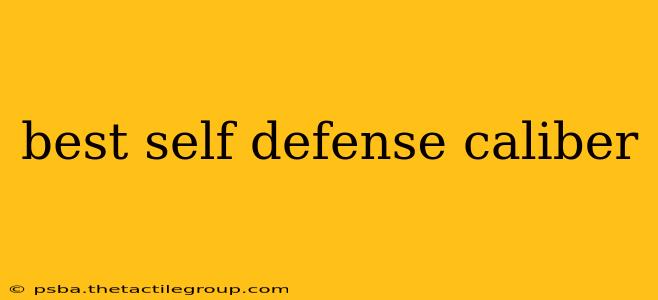Choosing the right caliber for self-defense is a crucial decision, impacting your safety and effectiveness in a critical situation. There's no single "best" caliber, as the ideal choice depends on individual factors like physical strength, experience, and intended use. This guide explores popular calibers, analyzing their strengths and weaknesses to help you make an informed decision.
Factors to Consider Beyond Caliber
Before diving into specific calibers, remember that the firearm itself, training, and situational awareness are equally vital components of effective self-defense. The best caliber in the world won't help if you can't handle the recoil, lack proper training, or fail to identify and avoid dangerous situations.
1. Shootability: Recoil and Control
Recoil management is paramount. A powerful caliber with excessive recoil might hinder your ability to accurately fire follow-up shots, rendering a larger round less effective than a smaller one you can control. Consider your physical strength and experience.
2. Penetration and Expansion: Stopping Power
Stopping power isn't solely determined by caliber but also by bullet design. Hollow-point rounds expand upon impact, increasing their stopping power by transferring more energy to the target. Full metal jacket (FMJ) rounds penetrate more deeply but may not incapacitate as quickly. Your choice should consider both penetration (to ensure sufficient stopping power) and expansion (to reduce overpenetration and risk to bystanders).
3. Availability and Cost: Practicality
Consider the availability of ammunition for your chosen caliber. Common calibers generally offer more readily available and affordable ammunition.
Popular Self-Defense Calibers: A Detailed Look
Here's a breakdown of some frequently chosen calibers for self-defense, weighing their pros and cons:
9mm Luger (9x19mm Parabellum)
- Pros: High capacity magazines, relatively low recoil, widely available and affordable ammunition, proven effective stopping power with proper ammunition selection (hollow-point). Excellent choice for beginners and experienced shooters alike.
- Cons: May require multiple shots for incapacitation in some cases.
.45 ACP (Automatic Colt Pistol)
- Pros: Significant stopping power, large bullet diameter leads to impressive energy transfer.
- Cons: Strong recoil, lower magazine capacity compared to 9mm, heavier firearm overall, more expensive ammunition. May not be suitable for all individuals, particularly those with less upper body strength.
.380 ACP (.380 Auto)
- Pros: Small and lightweight, easy to conceal, manageable recoil, relatively inexpensive ammunition. Good option for those seeking a smaller, easier-to-handle firearm.
- Cons: Lower stopping power compared to 9mm or .45 ACP; may not be as effective against larger threats.
.22LR
- Pros: Very low recoil, inexpensive ammunition, high capacity magazines, quiet operation with subsonic rounds. An option for those prioritizing ease of use and low recoil.
- Cons: Low stopping power, relatively poor penetration compared to other calibers, requires precise shot placement. Generally not recommended as a primary self-defense caliber.
10mm Auto
- Pros: High stopping power, powerful round.
- Cons: Significant recoil, can be challenging for less experienced shooters, may be overkill for typical self-defense scenarios. Expensive ammunition.
Conclusion: Choosing the Right Caliber
The best self-defense caliber is subjective and depends on your individual needs and capabilities. While this guide provides insights into popular choices, it's crucial to prioritize:
- Proper training: No firearm is effective without proper training.
- Responsible gun ownership: Familiarize yourself with all applicable laws and regulations.
- Safe handling practices: Always handle firearms safely and responsibly.
Ultimately, the best caliber is the one you can shoot accurately and consistently under stress. Consider visiting a range, renting different firearms, and trying out various calibers to determine what best suits your individual needs. Consult with experienced firearms instructors and professionals for personalized advice. Remember, responsible firearm ownership is paramount.

